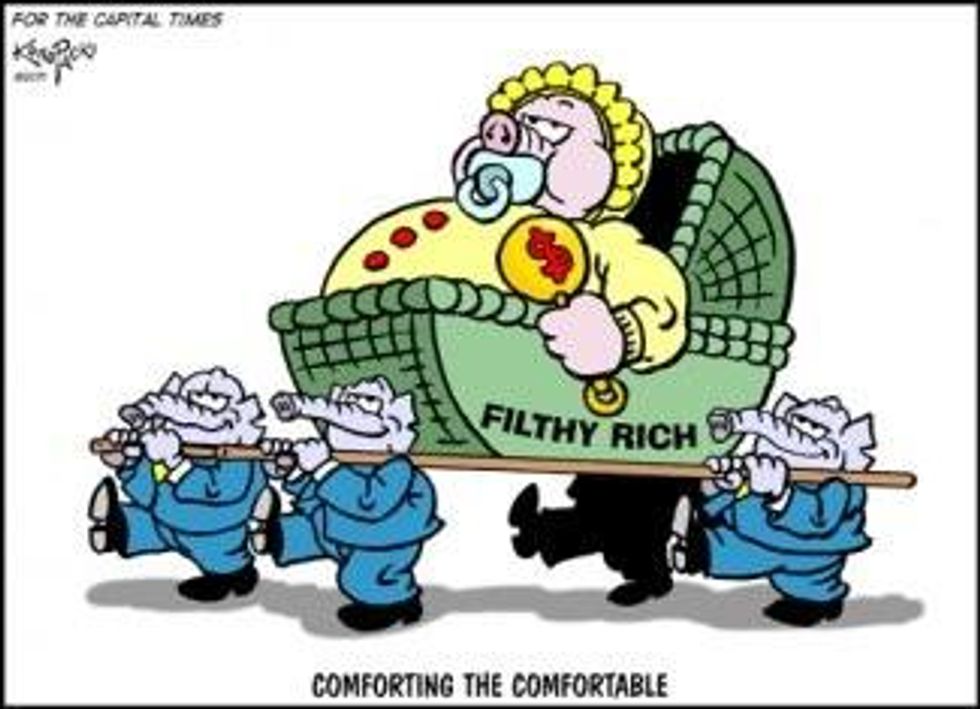In this age of afflicting the poor and comforting the rich -- a favorite pastime of the tea partiers and the new Republican Party they've helped shape -- there's a popular myth making the rounds on the Internet that nearly half of working Americans don't pay taxes, and isn't that an outrage?
Candidates like Michele Bachmann and Rick Perry, the Texas motor mouth who believes Social Security is a Ponzi scheme, help build this perception, insisting that before restoring the pre-George W. Bush taxes on the rich we need to make everyone pay some federal income tax.
Bachmann says the lower-income workers, after all, use the parks and roads and benefit from defense measures the government provides to keep us all safe. Perry claims that it's an "injustice" that so few American citizens pay income taxes. Of course, in Texas they don't have any personal state income tax at all, just the highest percentage of uninsured and a growing unemployment rate. Perhaps that explains a lot.
But the truth is that every working American pays taxes. Before they even get a chance to cash their paychecks, 6.2 percent has been deducted for Social Security and another 1.45 percent for Medicare. (This year the Social Security payroll tax for everyone has been temporarily lowered to 4.2 percent as part of President Obama's stimulus program.)
In other words, they're contributing just as big a percentage of their income to the two major federal budget programs as do the CEOs of major corporations. In fact, because people don't pay Social Security taxes on income over $106,800, the poor actually pay a higher percentage than the wealthy.
Everyone also pays sales taxes, property taxes if they own property or indirectly if they rent, gasoline taxes to build those roads Bachmann thinks they're driving on for free, and fees to visit national parks and license their cars, just for starters.
It's true that the lower half of wage earners, many of them living on the edge of poverty, wind up escaping additional income taxes, but that's because at one time in this nation's history we decided to tax citizens on their ability to pay because we believed it was the right thing to do. The Christian way, if you please.
It was considered quintessentially American for the wealthy to shoulder a larger share of the load it requires to run the country's business. If you didn't make a lot, you didn't pay a lot. If you made a bundle, you paid a bundle for the good of the nation.
Indeed, for decades during the mid-1900s, the richest people in America paid a federal income tax rate of 90 percent of every dollar they made over $1 million. Interestingly, the country got along just fine. Businesses expanded. The middle class came into vogue. Young couples could buy houses, afford cars and eventually send their kids to college.
It was all quite unlike today after George Bush saw to it that the wealthiest in the land got a 10 percent tax cut -- 39.6 percent to 35 percent for the highest bracket -- and now, in the face of a growing national debt, the Boehners and Cantors in Congress refuse to even consider restoring the old rate. Those cuts contributed mightily to turning a national budget surplus into a huge deficit, especially when decisions were made to fight expensive wars and increase defense spending without raising any additional revenue.
And now Boehner and Cantor don't even want those making a million or more a year to have to pay a dime extra, as the president has proposed.
Not coincidentally, it was this same wealthy class that hatched the mortgage schemes, played recklessly with people's savings and crashed the economy. Not only have they escaped any penalties for their disgraceful behavior, but the GOP believes it's the working people who need to take the hit to reduce the deficit.
America's middle class has already paid more than its fair share. They've suffered pay cuts, layoffs, lost homes and cars and now close to one in six of them live in poverty. To ask them to face a future with weaker Social Security and Medicare programs is nothing short of criminal.
It's well past time for those who can afford it and who have benefited the most from government's many services to pitch in and help right the ship -- at the very least, end the Bush tax cuts and help restore some fiscal responsibility to the nation's budget.


